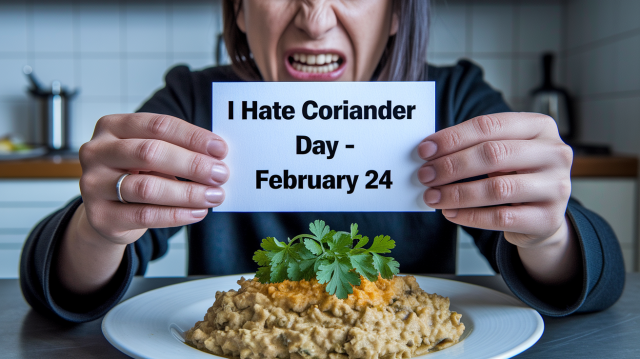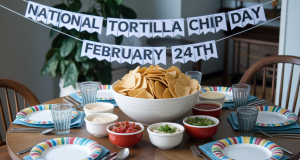I Hate Coriander Day, celebrated annually on February 24, is a lighthearted occasion dedicated to those who share a strong aversion to the herb coriander, also known as cilantro. This quirky day provides an opportunity for coriander-haters to unite, express their dislike for the herb, and explore the genetic reasons behind their taste preferences. It celebrates individuality and diversity in culinary experiences while fostering a sense of camaraderie among like-minded individuals.
Why Is It Celebrated?
This day is celebrated to bring together people who dislike coriander, validating their experiences and raising awareness about the genetic factors that influence taste aversions. It also encourages discussions about food preferences and promotes transparency in culinary practices, such as clear labeling of ingredients on menus.
Cultural Significance
I Hate Coriander Day reflects the growing recognition of how genetics influence taste and highlights the importance of respecting diverse food preferences. It has evolved into a fun cultural phenomenon that celebrates individuality in a playful and inclusive way.
Unique Traditions:
- Social Media Engagement: Participants share memes, stories, and recipes that exclude coriander using hashtags like #IHateCoriander.
- Coriander-Free Potlucks: Friends gather to enjoy meals free of coriander, ensuring everyone can savor the dishes without worry.
- Merchandise: Fans of the day often wear themed apparel or display items expressing their dislike for the herb.
Social Impact
The day fosters connections among people who share similar culinary dislikes, creating a sense of community. It also raises awareness about genetic diversity in taste perception, encouraging acceptance of differing food preferences.
The Importance of It
I Hate Coriander Day emphasizes the importance of celebrating differences in taste while promoting understanding and inclusivity. It offers a platform for individuals to bond over shared experiences and advocate for greater transparency in ingredient labeling.
Educational Value
The day educates people about the science behind taste aversions, particularly the genetic basis for disliking coriander. Studies have shown that some individuals perceive coriander as having a soapy flavor due to specific olfactory receptor genes. This knowledge fosters greater awareness and acceptance of diverse palates.
Emotional Connection
For many participants, this day provides a sense of belonging as they connect with others who share their aversion to coriander. The humor and lightheartedness surrounding the celebration create lasting memories and strengthen bonds.
The Origin of It
I Hate Coriander Day originated from a Facebook group called “I Hate Coriander,” created in 2013 as a space for coriander-haters to share their experiences. The group’s popularity quickly grew, amassing hundreds of thousands of members and inspiring merchandise sales. The day has since become an international event celebrated by food enthusiasts worldwide.
Historical Events:
- The creation of the “I Hate Coriander” Facebook group marked the beginning of this movement.
- Research studies on genetic factors influencing coriander aversion have gained attention in recent years.
Evolution Over Time:
Initially a niche online community, I Hate Coriander Day has expanded into a global celebration with participants engaging in both online and offline activities.
How to Celebrate
Here are some fun ways to observe I Hate Coriander Day:
- Host a Coriander-Free Dinner Party: Invite friends to enjoy dishes that exclude coriander.
- Share Online: Post memes or personal stories about your dislike for coriander on social media.
- Experiment with Recipes: Try cooking new dishes that substitute coriander with other herbs like parsley or dill.
- Spread Awareness: Educate others about the genetic basis for coriander aversion.
- Wear Merch: Show off your distaste with themed clothing or accessories.
Conclusion
I Hate Coriander Day is a playful celebration that unites people through shared culinary preferences while promoting awareness about genetic diversity in taste perception. Whether through humorous social media posts or coriander-free gatherings, this day offers an opportunity for participants to embrace their unique tastes and connect with others who feel the same way. Let’s celebrate individuality—one coriander-free dish at a time!












